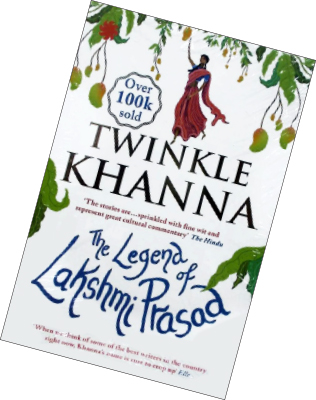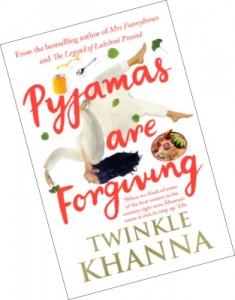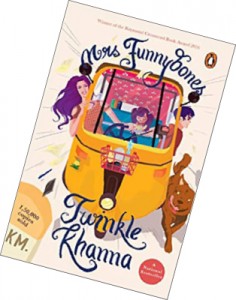

I always prided myself on being the kind of person who never judged a book by its cover until this overly righteous sense of self-worth hoisted me on my own petard (I have always wanted to use this strange phrase!) as I found myself unable to put down The Legend of Lakshmi Prasad until I had reached the very end. Its author is a writer of serious talent.
Twinkle Khanna has been around for a while, initially making news as the daughter of Dimple and Rajesh Khanna, and then not so much written about as an actor. After staying hidden in a fairly long period of silence followed by marriage to actor Akshay Kumar and family life, she slowly began to re-surface, this time breaking news as a writer of pretty strong and well-argued opinions in her blog posts and columns published in the Times of India and DNA. Her pieces were not only well-written, they were spunky, and her observations politically and otherwise astute. Then, in 2015, came her first book-book, Mrs Funnybones, with a nearly not-there tagline that said, ‘She’s just like you and a lot like me’, written in the tradition of Helen Fielding’s Bridget Jones’s Diary which I had thoroughly enjoyed.
In any case, I should have got the hint from this line in the blurb describing her: ‘She narrowly escaped a gruesome tragedy when Bollywood tried to bludgeon her brain to the size of a pea, but she ducked at the right moment and escaped, miraculously unharmed.’ How many of us have the guts to admit to ourselves, let alone holler it from the rooftops, that we sometimes bombed at what we did? Despite the hint, intellectual snobbery got in the way of my vision and although I presented a copy of Mrs Funnybones to my mother who chews up books and crosswords at the rate of madness in a minute, I myself didn’t deign to read it until many weeks had gone by. Btw, if you thought Twinkle Khanna loved her name, read this: “… I decided to take the baby (fondly referred to as the ‘little beast’) to my mother’s house so that she can harass other members of the family besides me. I get there and mother dearest is sitting with her close friend, Honey, and trying to call up their friend, Bubble. Honey! Bubble! Dimple! Does anyone still wonder why I have been lumped with a name that rhymes with sprinkle and wrinkle?”
In 2016 came The Legend of Lakshmi Prasad. While this bit of publishing news registered, it only barely did that until along came Pyjamas are Forgiving in 2018. Now this was getting to be too much, for books’ sake! Some curiosity was called for. So at last I ordered these books on Amazon and received them pronto, along with Shweta Bachchan (Yes, Jaya and Amitabh’s daughter) Nanda’s Paradise Towers. After all, it was Bollywood Babies’ season in the sun of the publishing scene. However, once unwrapped, the books went into the cupboard, barely examined.

Until a few days ago when I took it out before seting out on a family holiday. I started reading Twinkle Khanna and this time she got me hooked. The writing is elegant, resonant, light without being fatuous, totally unselfconscious and, at times, quietly moving. The Legend of Lakshmi Prasad left me wondering how she knows so much — some snobbery, but mostly genuine puzzlement — because without knowing how can you write so simply yet profoundly about being human. It is a set of three short stories and one longer one, more like a novella. The themes are different, the characters and locations unique, and the tellings have their own voices. The novella, I discovered, is the fictionalised account of the story of Arunachalam Muruganantham, a school dropout from Coimbatore who has revolutionised the world of less privileged women by inventing affordable sanitary napkins that can be manufactured at very low cost by women themselves. After reading the book, I listened to the TEDx talk given by Murugananthan: it brought tears to my eyes even as I laughed with the audience and the man himself as he narrated his story. Twinkle Khanna faithfully captures the spirit of the man and his mission in her beautifully written account: ‘The Sanitary Man From A Sacred Land’. The three shorter stories are equally engaging, so engaging that I read the book in one sitting. Incidentally, both Mrs Funnybones and The Legend of Lakshmi Prasad are available in Hindi translation.
I realised that Twinkle Khanna’s fictionalised account is the basis for the Hindi film Padman. Further, in the serendipitous manner of coincidences, on Jan 23, The Hindu carried a news item headlined ‘Short film set in Indian village gets Oscar nod’. The 26-minute film, Period. End of Sentence, is about local women in a village in Uttar Pradesh finding a steady income and access to feminine hygiene thanks to Muruganantham’s revolutionary low-cost sanitary pad-making machine. This is bieng directed by award-winning Iranian-American filmmaker Rayka Zehtabchi and is “a creation of The Pad Project, an organisation established by an inspired group of students at the Oakwood School in Los Angeles and their teacher, Melissa Berton.”

Stories inevitably lead to more stories. Twinkle Khanna has been quoted as saying her favourite book is The Little Prince (Le Petit Prince in French) by Antoine de Saint-Exupéry “because more than a children’s book, it is an allegory of love and loneliness”. This is significant because children’s books are so often not given the respect they deserve. Equally significant is her comment in a newspaper interview: “There are books that I read like A Man Called Ove by Fredrik Backman or anything by Alice Munro and bang my head on my window in despair because I cannot write like them. And then I read a whole spate of popular writers, I won’t name them, and instantly feel better about my own writing.” What she says provides an insight into her straightforward manner, decidedly one of the bright features of her writing.
Her third book is a novel. Pyjamas Are Forgiving is set in a residential ayurvedic clinic in Kerala. Although it is not as compelling as Lakshmi Prasad, it nevertheless has an authentic ring that makes it refreshing even if the love story it spins is not quite so engaging. Still, I look forward to her next book and if you haven’t yet read her, you should quickly set that record right.
As Mrs Funnybones says, quoting “one of Baba Twinkdev’s sayings: A fool walks around with his nose in the air while the wise keep theirs firmly buried in books. Happy reading!”
Indeed. Happy reading!
The columnist is a children’s writer and senior journalist.





